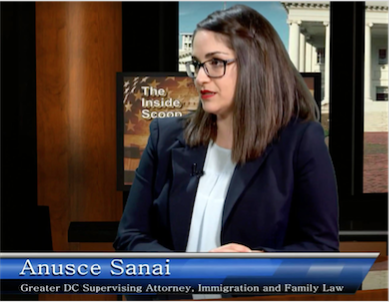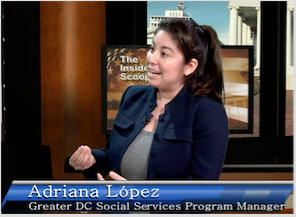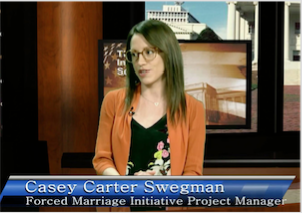Tahirih Justice Center – Inside Scoop
(May 7, 2018) Catherine Read speaks with Anusce Sanai, Adriana López and Casey Carter Swegman about their roles at the Tahirih Justice Center. Through direct services, policy advocacy, training and education Tahirih protects immigrant women and girls, and promotes a world where women and girls enjoy equality and live in safety and dignity. The center was founded in 1997 with the proceeds from the book “Do They Hear You When You Cry” published by attorney Layli Miller-Muro, which documented her landmark case of Fauziya Kassindja. Kassindja fled Togo to seek asylum in the US in order to avoid forced marriage and female genital mutilation (FGM). This landmark case set national precedent for United States Immigration Courts, that established gender-based persecution as grounds for asylum.
 In the first segment Catherine speaks with Anusce Sanai, who is the Greater DC Supervising Attorney for Immigration and Family Law for Tahirih. She gives a broad overview of the holistic nature of the services that Tahirih provides for its clients. The center works with a network of over 1400 pro-bono attorneys, located in five locations throughout the United States. In addition to the Greater DC flagship office located in Falls Church, Tahirih has offices in Baltimore, Houston, Atlanta, and San Francisco. In addition to providing legal services to help clients navigate the immigration system, Tahirih assists clients who are fleeing violent domestic situations with every type of wrap-around social service that they will need to survive and to thrive.
In the first segment Catherine speaks with Anusce Sanai, who is the Greater DC Supervising Attorney for Immigration and Family Law for Tahirih. She gives a broad overview of the holistic nature of the services that Tahirih provides for its clients. The center works with a network of over 1400 pro-bono attorneys, located in five locations throughout the United States. In addition to the Greater DC flagship office located in Falls Church, Tahirih has offices in Baltimore, Houston, Atlanta, and San Francisco. In addition to providing legal services to help clients navigate the immigration system, Tahirih assists clients who are fleeing violent domestic situations with every type of wrap-around social service that they will need to survive and to thrive.
The immigration system in the United States is complex and ever-changing, and the success rate for women seeking asylum is very low. However when clients are represented by Tahirih attorneys, there is a 95% success rate. Clients come to the center mostly through word of mouth referrals and through agencies who are on the ground working with detained individuals. The attorneys work to stay on top of best practices and fully understand the rules and procedures that can affect their clients. Today, there is a huge backlog of cases, which is challenging for women who are fleeing difficult situations and are trying to make a fresh start for themselves.

López points out that there are a variety of ways for people to volunteer, even if they are not able to provide pro-bono legal services. The center is always seeking out mentors for women who can provide professional support and assist clients in navigating the difficult terrain of living in a foreign country. They are also always in need of help of administrative support in their office, with childcare, assisting with support groups and providing translation services. If you are interested in learning more, visit the website to learn about all of the opportunities.

Carter Swegman, in conjunction with community partners and bi-partisan support in the Virginia legislature, passed the first bill of its kind in the US designed to protect children from forced marriage. Co-patrons of the bill, State Senators Jill Vogel and Jennifer McClellan worked very hard to make this bill a reality. The bill does include a provision where a 17 year old can request emancipation from their parents in order to marry. This is a process built into the system to enable those who are serious about wanting to get married, while still protecting minors from being forced into a situation against their will.
The Tahirih Justice Center has experienced exponential growth since its inception in 1997 thanks to the generous donors who support their mission. The center is funded in part by government grants, foundations, corporations, law firms and private donors. Their annual Gala is happening on Friday May 11th at the Marquis Marriott in Washington, DC, featuring Grammy award winning singer Andy Grammer You can visit their website to purchase tickets, to make a donation in support of the center and to volunteer.
You can follow the Tahirih Justice Center on Facebook, @TahirihJustice on Twitter, and subscribe to their YouTube Channel. The Greater DC Office can also be reached by phone at 571-282-6161